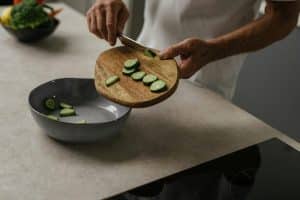Food Safety Tips for Home Kitchens
Welcome to the world of home cooking! There’s nothing quite like whipping up a delicious meal in your own kitchen, but it’s important to remember that food safety should always be a top priority. The last thing you want is for your tasty dish to turn into a foodborne illness. That’s why we’ve put together some essential food safety tips to help you keep your home kitchen clean, healthy, and free from harm.
Wash Your Hands Frequently
Before you even think about touching any food, make sure you wash your hands thoroughly with soap and water. This may seem like a no-brainer, but it’s a step that’s often overlooked in the rush to get cooking. Proper hand-washing is crucial because it helps prevent the spread of bacteria from your hands to your food and surfaces. Make sure to scrub your hands with soap for at least 20 seconds and dry them with a clean towel.
Keep Raw Meats Separate
Raw meats, poultry, and seafood carry harmful bacteria, so it’s important to keep them separate from other foods. When storing these items, always keep them on the bottom shelf of your fridge to prevent any juices from dripping onto other foods. Use separate cutting boards and utensils for raw meats and wash them thoroughly with hot, soapy water after use.
Clean Your Kitchen Regularly
Keeping a clean kitchen is crucial for food safety. This includes wiping down countertops, utensils, and cutting boards with hot, soapy water after each use. Also, make sure to regularly disinfect surfaces with a kitchen-safe cleaner to prevent the build-up of harmful bacteria. Don’t forget to clean your fridge and pantry shelves as well to prevent the growth of mold and bacteria.
Use Proper Storage Techniques
Knowing how to store your food properly is paramount to maintaining its safety. Always refrigerate raw and cooked foods promptly to prevent bacteria from growing. Keep your fridge at or below 40°F and your freezer at or below 0°F to slow the growth of bacteria. When reheating leftovers, make sure to heat them to an internal temperature of at least 165°F to kill any harmful bacteria.
Cook Food to the Right Temperature
Another essential food safety tip is to make sure you cook your food to the correct temperature. Raw meats, poultry, seafood, and eggs must be cooked to a safe internal temperature to kill any harmful bacteria. Use a food thermometer to ensure that meat is cooked to at least 165°F, poultry to 165°F, and seafood to 145°F.
Practice Clean Food Preparation
Cross-contamination can occur when bacteria from raw foods come into contact with ready-to-eat foods, so it’s essential to practice clean food preparation. This means using separate cutting boards and utensils for raw and cooked foods, as well as washing your hands and any surfaces that come into contact with raw foods. It’s also crucial to never use the same plate or utensils for raw and cooked foods.
Be Mindful of Food Allergens
If you or your loved ones have food allergies, it’s essential to be extra cautious in your kitchen. Make sure to read food labels carefully and be aware of cross-contamination that can occur from shared surfaces or cookware. It’s always better to err on the side of caution and avoid serving any food that may contain allergens.
Regularly Check Expiration Dates
It’s easy to forget about the expiration dates on food products, but they play a critical role in food safety. Always check expiration dates before using any food items and make sure to discard any that have expired. This is especially important for foods that are prone to bacterial growth, such as meat, dairy, and eggs.
Conclusion
By following these essential food safety tips, you can ensure that your home kitchen is a safe, healthy environment for cooking and preparing food. Remember to always wash your hands, keep raw meats separate, clean your kitchen regularly, store food properly, cook food to the right temperature, practice clean food preparation, be mindful of food allergens, and check expiration dates. With these measures in place, you can enjoy your home-cooked meals without having to worry about foodborne illness.










